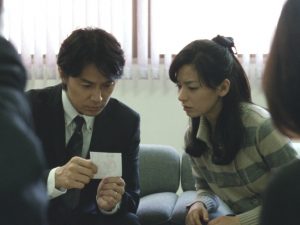

Some of the ideas rearing their fearsome heads in "Like Father, Like Son", that biological ties earn a child optimal love from its parents among them, fall into the category of dumb, but powerful. It’s not that you judge the stupefaction of Ryota and Midori Nonomiya (Masaharu Fukuyama and Machiko Ono), a Japanese husband and wife, when their hospital bluntly informs them that their six year old, Keita, is not their flesh and blood. To learn that the baby who Midori bore into the world after 9 months was not the little bundle she brought home that day would be uncanny. What doesn’t make sense, however, is that Keita’s worth increasingly dims in his father’s eyes thereafter.
That’s the real conflict of “Like Father, Like Son”. Ryota, a competitive career man who doesn’t see the point of kindness, allows a technicality to justify both his disdain for the parents of his biological son and his disdain for Keita himself. At a piano recital, Keita clunks out "Mary Had a Little Lamb", seeing the tune through to its end, but with little rhythm. He's much more passionate playing Wii tennis with his grandmother (who wouldn't be?). In a moment that is cold where it should be precious, Keita praises the performance of the talented little girl who follows his ditty, only to have his father reply "How can you stand it?"
Thankfully, Ryota isn't the only character with sway in "Like Father, Like Son". Hirokazu Kore-eda, the writer and director, allows all of his characters to have their moments of distinction, coloring the story's pallid circumstances by contrasting their personalities with each other. Particularly, Kore-eda etches out the differences between the more affluent, refined Nonomiyas and the goofier yet sturdier parents of their biological son, Yukari and Yudai Saiki (played by Yôko Maki and Rirî Furankî).
The families meet after they're both given the news about their sons. They decide to spend time together with the possibility of swapping Keita with Ryusei, the Saiki's boy, after enough familiarity forms. The permutations of the courtship that ensues between the Nonomiyas and Saikis are neat to watch and most striking when seen through the eyes of Keita and Ryusei (the terrific Keita Nonomiya and Shôgen Hwang). During one of their first meals together, Midori prepares a meat for Rysuei---who is more used to rice-filled take-out---that he hasn't had before. She and Ryota watch him as he struggles to eat the slippery dish with his chopsticks, like spectators watching a tightrope walker on the wire. After a few bites, he looks perplexed and then pleased. His approval of the meal is just enough to suggest that maybe the Nonomiya's rigid world has its perks.
"Like Father, Like Son" is a nervous system of such moments, tugging at you the way a child might tug at the bottom of a mother's skirt for a million and one reasons. Each scene feels as significant as the one before and after, even though some reverberate or sting for longer. That's the kind of dreadful beauty that comes with parenthood. No matter what the Nonomiyas and Saikis do, and I think in the end, they probably make the right choice, their lives are going to be a little off-kilter. Their sons were kidnapped for a few seconds, taken in the hands of a malicious nurse. The ripples of that fluke crime are real and unpredictable, if not always sad. To let them touch you would require a solid understanding of what you value. That's hard for anyone to know sometimes, but Kore-eda succeeds in making that steadiness seem possible, even effortless.